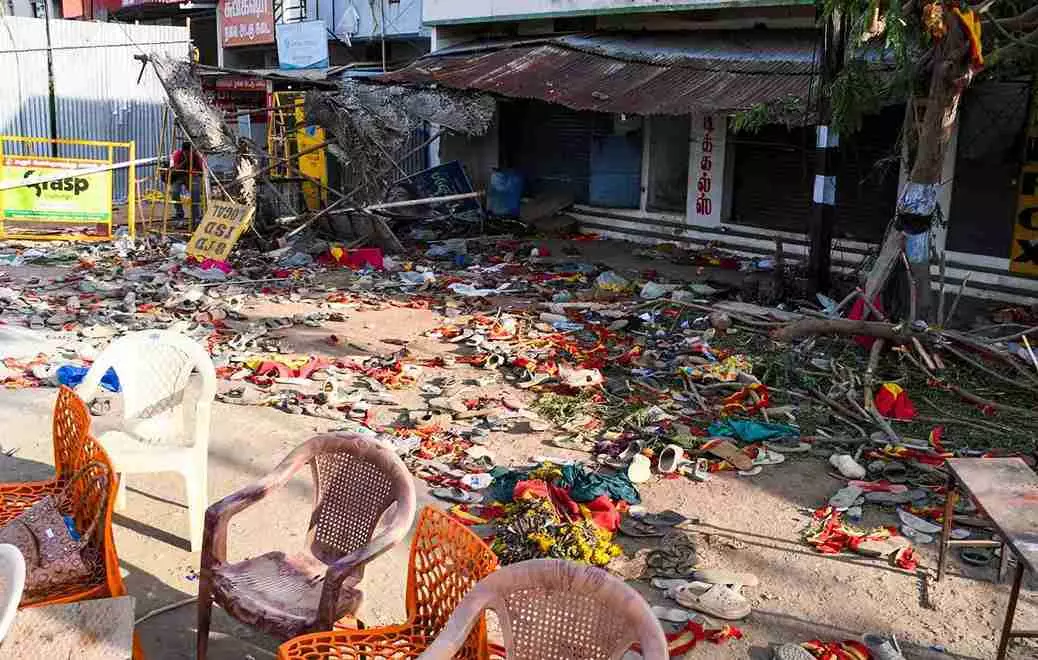
The site of the Karur stampede. File photo
Why SC transferred Karur stampede probe to CBI? Doubts 'impartiality' of TN investigation
In its order, SC bench noted top police officials had already gone public, defending their subordinates in press meets, claiming "prompt action" was taken at Karur

In a significant intervention that has sent shockwaves through Tamil Nadu's political corridors, the Supreme Court of India has transferred the investigation into the tragic Karur stampede—where 41 lives were lost in a crowd crush during a political rally—to the Central Bureau of Investigation (CBI).
The apex court also constituted a three-member Supervisory Committee, headed by retired Justice Ajay Rastogi, to oversee the probe, citing concerns over the impartiality of the state police amid public outcry and media statements by top officials.
The order, passed by a bench comprising Justices JK Maheshwari and NV Anjaria, stemmed from on a batch of petitions related to the September 27 stampede at a TVK political rally at Velusamypuram in Karur district. The incident occurred during a roadshow by Tamilaga Vettri Kazhagam (TVK), the regional party led by popular actor-turned-politician Vijay, which had attracted massive crowds eager to catch a glimpse of the star.
What began as a routine political event spiralled into mayhem leading to the stampede around 7.30pm, leaving 41 dead—including women and children—and over 100 injured.
'Procedural lapses'
The SC's 25-page order didn't hold back in critiquing the Madras High Court for what it described as a "lack of sensitivity and propriety" in handling the case.
Also read: Karur stampede: As SC raps HC for critiquing Vijay, TVK says ‘we never fled scene’
Justices Maheshwari and Anjaria flagged the "multiplicity of proceedings" across the high court's principal bench and Madurai bench, noting how writ petitions seeking CBI probes were dismissed by a division bench, even as a single judge suo motu expanded the scope of unrelated petitions to form a Special Investigation Team (SIT).
"Such recourse prima facie indicates the lack of sensitivity and propriety to deal with such a matter creating multiplicity of proceedings," the bench observed, directing the high court's registrar (judicial) to seek an explanation from the Chief Justice on procedural lapses, including why a petition for Standard Operating Procedures (SOPs) for rallies wasn't treated as a Public Interest Litigation (PIL) and heard by a division bench.
The SC also suspended the one-member enquiry commission headed by retired Justice Aruna Jagadeeshan, announced by Tamil Nadu Chief Minister on the day of the tragedy, and the SIT ordered by the single judge.
At the heart of the order was the apex court's prima facie concern over the independence of the state police probe.
An FIR registered under sections of the Bharatiya Nyaya Sanhita (BNS) and the Tamil Nadu Public Property Act, alleged negligence in crowd management. However, the bench noted that top police officials had already gone public, defending their subordinates in press conferences and claiming "prompt action" was taken.
"It is urged before us that if investigation would be carried out by the police personnel whose top officials have already come out before the media, making a statement that their subordinate officers have taken adequate steps and are not at fault, how far such an investigation would be fair," the order stated.
"Prima facie, this fact in itself creates a doubt in the minds of the general public about the independence and impartiality of the investigation," the order pointed out.
Also read: Supreme Court orders CBI probe into Karur stampede
Citing the landmark 2010 judgment in State of West Bengal vs. Committee for Protection of Democratic Rights, the SC order emphasised that CBI probes should be ordered sparingly—but this case, with its "national ramifications" and impact on fundamental rights, warranted exceptional measures.
"The faith and trust of the general public on the process of investigation must be restored," it added.

